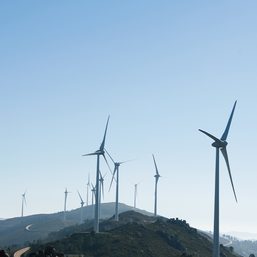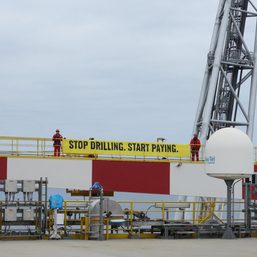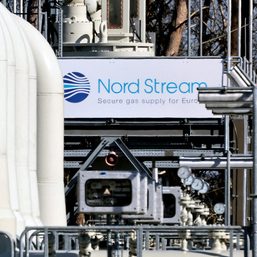SUMMARY
This is AI generated summarization, which may have errors. For context, always refer to the full article.
![[OPINION] What is the ‘endgame’ for BBM’s gas transition?](https://www.rappler.com/tachyon/2024/03/IMHO-Marcos-Endgame-gas-transition-March-19-2024.jpg)
The development of the Philippine gas sector is one of the priorities of the Marcos government in the name of energy security. The past few weeks have seen efforts to achieve this goal gain steam.
In the Senate, a technical working group recently discussed Senate Bill 2247, which focuses on the development of the industry’s downstream phase, meaning the conversion of gas into products such as liquified natural gas.
Recent consultations held by the Department of Energy (DOE) and the Climate Change Commission (CCC) have also included a heavier dependence on natural gas, presenting it as necessary for an energy transition that would apparently lower electricity costs and greenhouse gas (GHG) emissions.
Even conglomerates are getting onboard this plan, as Meralco PowerGen Corporation and Aboitiz Power announced their intent to invest in San Miguel Global Power Holdings Corporation’s gas-fired facilities in Batangas, which would be worth PHP185 billion. They claim that this would make energy in the country more “affordable to a broader base of Filipino consumers.”
This move was presented as a powerful alliance working together for a greater good, reminding us of the plot of countless superhero movies of the past two decades.
If that is the case, then it is more than fair to ask: how do we achieve the “endgame” here?
Higher costs
The promise of gas making energy affordable to more Filipino consumers, as claimed by proponents in the government and business sectors, is questionable at best. Several examples from other countries have shown the costs of a stronger dependence on this fossil fuel.
In Pakistan, where gas comprise almost one-third of its installed capacity, some residents recently experienced a gas price hike of up to 67%, while the competitiveness of its export industries are being threatened by its rising costs.
A similar case has been observed in Bangladesh, where its reliance on imported gas resulted in periods of rationing for industries and higher costs for gas and electricity on households, commercial consumers, and other users.
It is also well-established how gas prices in the global market can wildly fluctuate, as seen most recently with the Russia-Ukraine war that greatly affected supply for said fuel. A strong dependence on yet another imported fossil fuel is a storyline we have already seen with coal, which has contributed to numerous issues with our country’s energy sector, such as high electricity bills for Filipinos.
Notice that when government and business representatives state all the benefits of an expanded gas industry, they would mostly cite the following: energy security, lower electricity costs, and job creation. These are all important components of national development; there is no question about that. But what about environmental protection and the well-being of communities, especially in areas near the proposed sites for the exploration of indigenous gas sources?
There will also be mentions of how gas is cleaner than coal, and how RE technologies are not mature enough to meet the Philippines’s energy demands; these justify it, in their words, as the “transition fuel.” Assuming that is true, then when and how would we reach its inevitable “endgame?”
Not just any transition
For the past few years, different sectors have been seeking answers to that question. So far, no specific answer has been provided.
Just energy transition is not an easy process to plan and implement. Yet it is necessary for all plans and strategies to properly execute this if our country is going to achieve energy security, climate change mitigation, poverty reduction, and other facets of sustainable development.
It is difficult to assess any potential gas phaseout strategy when the plans that are supposed to present this are still yet to be publicized. As of this writing, neither the updated Philippine Energy Plan or the NDC Implementation Plan, whose development is led by the DOE and CCC respectively, has been finalized.
The bills promoting the gas sector’s development also feature little to no strong consideration of the Philippines’s climate targets. The current version of SB2247, for instance, mentions nothing about how this would impact the attainment of the country’s self-imposed NDC targets on reducing GHG emissions.
If gas proponents truly mean their claims that it is a “transition fuel,” then there should be a clear plan with an exit strategy for this fossil fuel that should be reflected and harmonized across all plans and strategies. There should be strict restrictions on the lifespan, capacity, and GHG emissions of all gas-related facilities, coupled with other reforms in the energy sector to protect the well-being of consumers.
The harmonization does not just apply across gas-related plans; it must also be reflected in how they impact climate and environment-related plans at the national and local levels. Any just transition has to ensure the placement and enforcement of social and environmental safeguards that protect communities and ecosystems from any adverse impacts caused by energy-related projects.
These would allow the country to have more flexibility in its energy sector to allow it to adjust to emerging challenges, a lesson that should have been taught to us by the COVID-19 pandemic. Aside from energy-related goals, this would also enable a true just transition into a renewables-dominant future, aligned with national sustainable development targets and global frameworks like the Paris Agreement.
Without proper restrictions, then this push for gas would result in a scenario similar to the current superhero movie genre: it goes on too long, the issues would repeat, and it would cost consumers more than just their money. – Rappler.com
John Leo Algo is the national coordinator of Aksyon Klima Pilipinas and the deputy executive director for programs and campaigns of Living Laudato Si’ Philippines. He is also a member of the Youth Advisory Group for Environmental and Climate Justice under the UNDP in Asia and the Pacific.
Add a comment
How does this make you feel?













There are no comments yet. Add your comment to start the conversation.